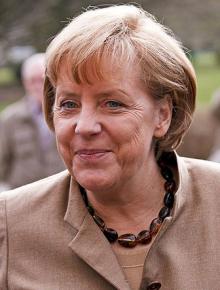Another status quo election in Germany?
analyzes Germany's political terrain ahead of upcoming elections.
ELECTORAL REVOLTS have rocked Europe for the last two-and-a-half years. Since the outbreak of the debt crisis, 17 national governments in the European Union have collapsed or been voted out of power. With 12 of these being members of the Eurozone, one would think the world's media would focus on the upcoming federal elections in Germany on September 22.
At first glance, the polls suggest an interesting race between Chancellor Angela Merkel's Christian Democrats (CDU) and the Social Democrats (SPD) led by Peer Steinbrück. Added up, the CDU and its current coalition partner--the Liberals (FDP)--stand at 46 percent of the vote in opinion polls. They are closely followed by the opposition parties--the SPD, the Greens and the Left Party (Die Linke), with 44 percent of the total.
Some polls suggest that two-thirds of the German electorate hasn't made up its mind. The probability of surprise, however, tends toward zero.
Once hailed as a new political force in the parliamentary landscape of Germany, the Pirate Party is lost at sea. It can't even make headway from the German secret service's (BND) complicity in the National Security Agency affair. Fortunately, the new right-wing populist party, Alternative für Deutschland (AfD), isn't gaining any ground either. While the party describes itself "as neither left nor right wing," it has not distanced itself from known fascists within its ranks. Both parties are unlikely to enter federal parliament.

It is almost certain that Angela Merkel will remain German chancellor for the next four years. Only the election itself will answer whether the FDP will stay in power or be replaced by the SPD in a grand coalition. Merkel and her CDU would prefer the former option.
However, the FDP is in slight danger of not crossing the 5 percent hurdle required to have seats in parliament. The current polls suggest between 4 percent and 6 percent for the staunch free-market liberals. That has forced Merkel to leave her options open. The twist is that a low turnout enhances the chances of the CDU-FDP to remain in power. This makes the elections a tiring business in highly volatile times.
A CDU-FDP government without an absolute parliamentary majority would be weak and fragile in the context of a deepening Eurozone crisis. Low growth rates in the center of the European Union (EU) and continued recession in the periphery could grind Germany's export-economy to a halt sooner than later. A CDU-FDP is no safeguard for prosperity.
Up until now, a devalued euro and low labor costs, twinned with high productivity in the German export sector, have turned the once-upon-a-time "sick man of Europe" into a powerhouse amidst indebted economies and failed states. Recently, the economist and former State Secretary of Finance Heiner Flassbeck called Germany "the most perverse economy of Europe."
But it is democracy that has been perverted. Millions of southern European workers have no say in who takes office in Berlin, yet they live under the directives of the German government, via the European Union and European Central Bank, among other avenues.
Merkel's CDU-FDP government has been able to count on support from both trade unions and the SPD for these policies. At the start of the crisis, trade unions put wage increases in the export sector on the back burner. This was aptly labeled "Krisenkooperatismus." It's a product of the regional economic policy ("Standortlogik") which German trade unions pursue.
This follows the SPD's strategic weakening of the unions through its neoliberal Hartz reforms at the beginning of the century. One would think that the SPD had learned a lesson or two after leaving government in 2009. Slavishly, it continues to argue and vote for the CDU's policies and is a friend the German ruling classes can always depend on.
It is no surprise that even the SPD's supporters and its leading lights such as Franz Müntefering cannot be mobilized for the elections. The SPD is no political alternative. Running candidate Peer Steinbrück complains that the German chancellor earns too little money. The party cannot agree on whether it wants to cut or increase taxation for the rich. And the party's best friend, the Greens, moves further away as election day nears. What a way to celebrate one's 150th birthday!
The far younger Die Linke has different problems to contend with. Lack of struggle, strategic disorientation and internalized debates have hampered the party's growth since the last elections. In many West German federal states, it hasn't succeeded in entering the parliaments.
Despite that, it is set to receive between 7 and 8 percent of the total vote and a guaranteed parliamentary presence on September 22. Its role in June's Blockupy protests and principled positions for a minimum wage, a millionaire's tax and the withdrawal of all German troops from foreign soil can attract both disenfranchised SPD voters and reach out to young anti-capitalist activists. Die Linke will continue to represent a historic opportunity for the extra-parliamentary and radical left in Germany.
While the media focus on meaningless slogans and horribly designed election posters and label the federal elections "the most boring ever," the outcome will hit hundreds of millions across the EU and the Eurozone. In Germany, no one seems to discuss this fact. Part of the reason for this is the fragmentation of political forces inside of Germany, which could halt this barbaric course.
Die Linke can contribute to building such a force capable of developing alternatives on the street, in the workplaces and in parliament beyond the elections.


